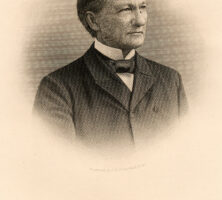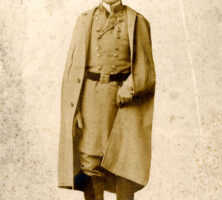A Confederate war hero, Methodist minister, and public servant, Clement Evans was a prominent Georgian during the nineteenth century.
Clement Anselm Evans was born on February 25, 1833, near Lumpkin in Stewart County. He married Mary Allen “Allie” Walton in 1854, and the couple had eight children, three of whom died in infancy. Evans studied law in Stewart County and in Augusta. He was admitted to the bar at the age of eighteen, elected a county judge at age twenty-one, and elected a state senator in 1859 as a member of the Know-Nothing Party. Switching political allegiances, Evans supported the Southern Democratic ticket in the election of 1860 and was chosen as an alternate elector to the Electoral College in support of the party’s presidential candidate, John C. Breckenridge.

Courtesy of Hargrett Rare Book and Manuscript Library, University of Georgia Libraries.
Civil War Career
When Civil War (1861-65) broke out in April 1861, Evans resigned from the legislature and joined the Confederate army as a private. Wounded five times (twice severely), he rose to command the Thirty-first Georgia Infantry (Bartow Guards) in May 1862. He fought in the Shenandoah campaign and participated in nearly every major battle of the Army of Northern Virginia. During the Gettysburg campaign, the Thirty-first Georgia reached York, Pennsylvania, the most northern advance of any Confederate unit. The regiment was also the last Confederate unit to leave Union territory, providing rear-guard support for the retreating Army of Northern Virginia after the Battle of Gettysburg.
In May 1864 Evans was promoted to brigadier general and commanded Lawton’s/Gordon’s Brigade in the Army of Northern Virginia’s II Corps. In November 1864, after John B. Gordon took over command of the II Corps, Evans was given the temporary rank of major general and commanded Gordon’s old division during the Petersburg campaign. Providing rear-guard support during Lee’s retreat toward Appomattox, Virginia, in April 1865, Evans led the last charge of the Army of Northern Virginia, after generals Lee and Grant had agreed to surrender terms. Evans was among the last group of soldiers to sign a parole certificate; he then rode home alone to Georgia.

Courtesy of Hargrett Rare Book and Manuscript Library, University of Georgia Libraries.
Postwar Career
While surveying the aftermath of the battle at Fredericksburg in December 1862, Evans felt divinely inspired to teach the lessons of humility, brotherly love, and Christian forbearance. He promised God and himself that he would enter the ministry after the war. Keeping his promise, Evans began a twenty-six-year career as a Methodist minister in 1866 by applying to the Annual Methodist Conference for admission to the ministry. He served churches in Athens, Atlanta, Augusta, Cassville, Cedartown, and Rome during his life.
In 1888 Evans was offered the position of chancellor at the University of Georgia but declined in order to continue his ministry. In 1896 he decided to seek the state’s governorship but withdrew before the Democratic primary. The next year he was appointed to Georgia’s first prison commission and spearheaded the effort to exempt first-time offenders from wearing the traditional white-and-black-striped prison uniform.
Evans remained a proud Confederate and promoter of the Lost Cause ideology throughout his life. He served as editor of the thirteen-volume Confederate Military History; coeditor with Allen D. Candler of Cyclopedia of Georgia; and author of Military History of Georgia. Evans also helped found the United Confederate Veterans (UCV) and served as its Georgia Division commander for several years. In 1909 he became commander in chief of the UCV but retired in 1911, shortly before his death.
When Evans died in Atlanta on July 2, 1911, his body lay in state in the central rotunda of the capitol, and the state legislature adjourned for a day to attend his funeral. He is buried in Oakland Cemetery in Atlanta. To honor his memory, the legislature created Evans County in the southeastern part of Georgia in 1914.








